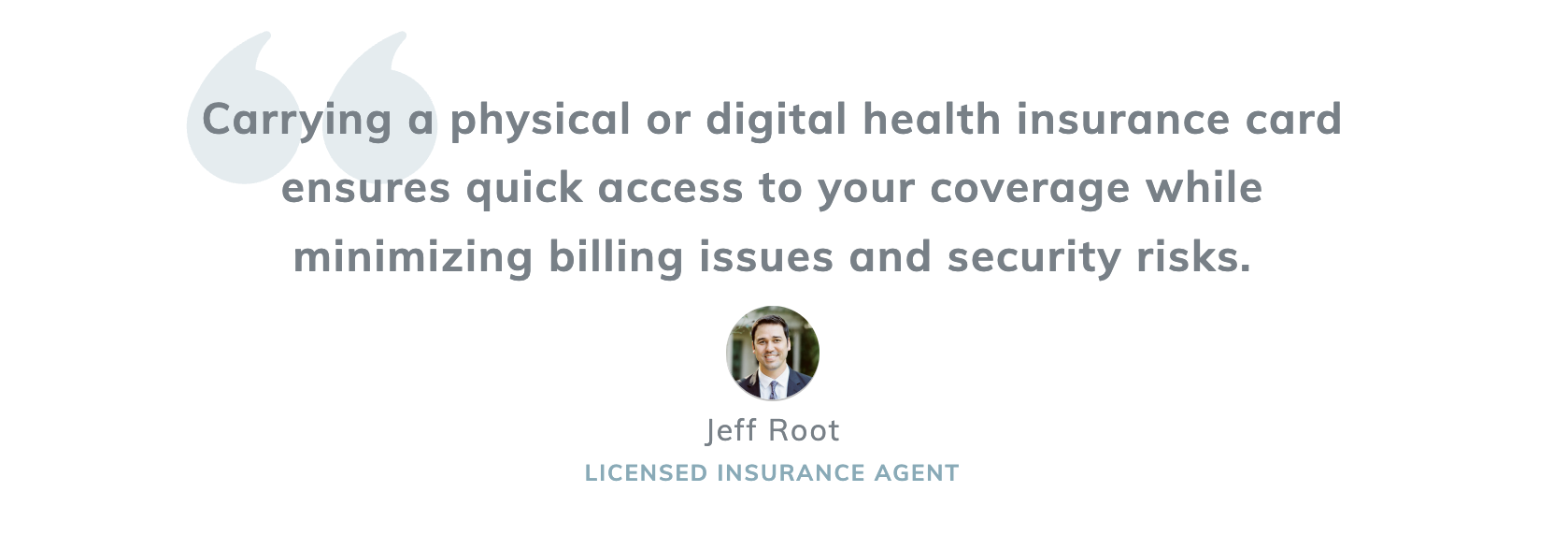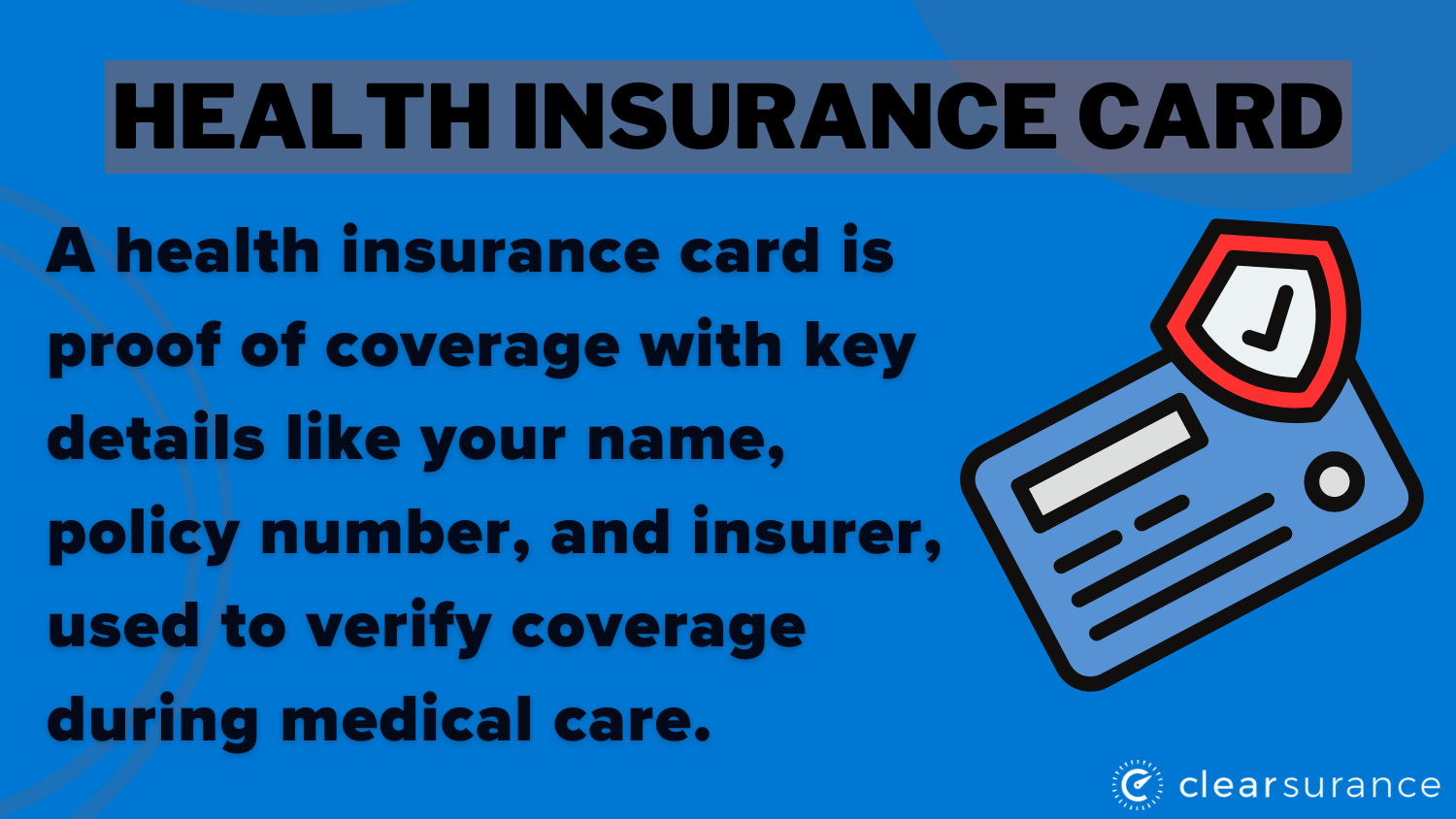Do I need to always have my health insurance card with me? Although it's not required, carrying it can help avoid billing problems and make medical visits more efficient. With over 2.6 million identity theft cases annually, opting for a secure digital card may be a safer choice.

This article explains the advantages and disadvantages of physical versus digital cards, when you might need one, and how to protect your health information. Before we get started, learn how to find affordable health insurance.
Then, enter your ZIP code above into our free comparison tool to see which companies have the cheapest rates in your area.
What You Need to Know
- Carrying your health insurance card prevents billing delays and upfront payments.
- Physical cards risk identity theft, with 2.6 million cases annually.
- Digital cards via mobile apps offer secure, convenient access to your information.
Information Included on a Typical Health Insurance Card
A typical health insurance card includes key details about your coverage. First, your name, and any dependents are listed. If you're the primary holder, your name appears first, while dependents may be listed below unless they have their own separate plan. The insurance company’s name is usually at the top of the card.
The group number is important if you receive insurance through an employer, as it identifies your plan and can provide discounts on services. In contrast, insurance obtained through the marketplace usually lacks a group number.
The policy or member ID number indicates which specific plan you hold, whether bronze, silver, or gold, each offering different levels of coverage. To gain more knowledge about type of plan, read our guide on comprehensive insurance coverage.

Additionally, the type of plan (PPO, HMO, EPO, or HDHP) dictates which providers you can use and the costs associated. Information on coinsurance or copayment outlines how much you will pay out of pocket for services, typically a fixed amount or a percentage.
Some cards also detail your prescription benefits, which help doctors know which pharmacy networks are covered. Finally, the back of the card includes phone numbers for contacting your insurer for general inquiries or billing assistance.
Pros and Cons of Carrying Your Health Insurance Cards on Your Person
If you’re constantly decluttering, you might wonder whether you need to carry your health insurance card with you. It's a debated topic, but ultimately, the choice is yours.
Carrying your card can be convenient for medical visits but risky if lost or stolen. This guide will help you decide if it's worth the risk.
Pros
- Easily Accessible: Having your insurance card ensures smooth medical visits by providing immediate access to your details. In emergencies, even without your card, you can still receive care, and some doctors can retrieve your insurance info from online databases.
- Access to Contact Information: Your card typically lists the insurance company's contact info, so you can call with questions anytime, anywhere.
- Prevent Billing Problems: Without your card, you might have to pay upfront and seek reimbursement later. Having your card helps ensure accurate billing based on your coverage.
Cons
- Fraud: If your card is stolen, thieves can use it for medical identity fraud, like visiting doctors, filling prescriptions, or filing false claims.
- Access to Personal Information: Your card may list sensitive details like your full name, employer, and family members, making you vulnerable to identity theft.
- Compromised Care: If someone uses your card and provides incorrect medical information, such as allergies, it could affect the care you receive, potentially leading to dangerous treatment errors.
Use our guide to health insurance terms to better understand your policy and what's written on your health insurance card.
Alternatives to Always Carrying Your Health Insurance Cards on Your Person
If you're concerned about losing or having your health insurance card stolen, there are alternatives to always carrying it with you. Many insurers now offer digital ID cards, which you can access through mobile apps, answering the question, can I have my insurance card on my phone or even can you add insurance card to Apple Wallet.
| Aspect | Physical Health Insurance Card | Digital Health Insurance Card |
|---|---|---|
| Convenience | Always available if carried | Requires smartphone or internet access |
| Risk of Loss or Theft | High if wallet is lost or stolen | Lower, as it is secured by phone authentication |
| Security | Vulnerable to identity theft if lost | Protected by phone’s security features (PIN, fingerprint, etc.) |
| Accessibility in Emergencies | Always accessible unless lost | Can be inaccessible if phone is out of battery or no service |
| Ease of Use | Simple, no technology required | Requires familiarity with the app or digital tools |
| Fraud Risk | High risk if stolen | Reduced risk due to login and authentication requirements |
| Information Updates | Requires a new card if policy changes | Instantly updated in app or digital platform |
| Space Requirement | Takes physical space in wallet | No physical space required, stored on the phone |
| Medicare Specifics | Medicare cards no longer use SSN for security | Medicare may offer digital alternatives |
This provides a secure option, especially if you're wondering, can someone else use my insurance card in case it’s lost or stolen. If you prefer not to carry your card, you can bring it only when needed, but this may be risky if you lost your insurance card and need to go to doctor or wonder, do you need your insurance card for urgent care.

Another option is keeping a copy of your card at home, so you can report it missing and prevent fraudulent use. If you're ever without your card, like in situations where you think, I have health insurance but no card, or question, can the hospital look up my insurance, many hospitals can retrieve your details directly.
And while you may wonder, can I use an old health insurance card, it’s important to ensure that your information is always current to avoid issues during medical visits. For additional insight, visit our guide about What is Medical Payments (MedPay) insurance, and what does it cover?.
Medicare Cards vs. Health Insurance Cards
If you receive your health insurance through Medicare, the information will look a little different than a card from an insurance company. For example, instead of a plan number or type, the card will indicate the type of Medicare coverage you have (A, B, etc.).
Additionally, current Medicare cards no longer list your social security number. Instead, you’re assigned a Medicare number which is used as your primary identifier. This policy helps to protect your personal information in the case of identity theft or fraud.
You can learn all about Medicare and Medicare supplement insurance with our comprehensive guide. Take a look at the table below for a comparison of physical and digital health insurance cards.
This comparison highlights the key differences between physical and digital health insurance cards, including aspects like convenience, security, and ease of use. Use our free quote tool below to get free health insurance quotes from local insurers.
Frequently Asked Questions
Can I use a picture of my health insurance card?
Yes, in many cases, you can use a health insurance card picture for verification during medical visits. However, check with your healthcare provider, as some may still require a physical or digital insurance card.
Check out our complete guide, No-Deductible Health Insurance: What You Need to Know, to learn more about health insurance.
Do you need a physical insurance card?
No, you don’t always need a physical insurance card. Many providers accept digital insurance cards, which can be stored on your phone through apps like insurance card in Apple Wallet or add insurance card to Google Wallet. Always verify with your provider to be sure.
Should I carry my health insurance card with me?
It's advisable to carry your health insurance card in a card and wallet holder or digitally, as it ensures smooth medical visits and prevents billing delays. Having your card on hand, either physically or as a digital insurance card, makes accessing care more efficient.
Do I need a physical copy of my health insurance card?
While a physical copy isn’t always required, having one can be convenient. However, you can also add health insurance card to Apple Wallet or Google Wallet for easy access. If you don’t have a card, check if you can print your health insurance card online as a backup.
Learn more in our detailed guide on small business health insurance.
Can I go to the doctor without my insurance card?
Yes, you can still receive care if you forgot insurance card doctor appointments. Some offices can look up your information, and urgent care can look up your insurance in many cases. However, you may be asked to pay upfront and get reimbursed later.
Start comparing affordable insurance options by entering your ZIP code below into our free quote comparison tool today.
I lost my health insurance card, can I still go to the doctor?
Yes, even if you've lost insurance card, you can still visit the doctor. Inform the office, as they may be able to look up your information. Contact your insurer to get a replacement card or use a digital insurance card.
Can I use a digital health insurance card?
Yes, many healthcare providers accept digital insurance cards. You can add insurance card to Apple Wallet or Google Wallet for easy access. Always confirm with your provider to make sure digital cards are accepted at your specific location.
Where should you keep your car insurance card?
Keep your car insurance card in a card and wallet holder inside your vehicle’s glove compartment for easy access. You can also store a digital insurance card on your phone through Apple Wallet or Google Wallet for added convenience.
Read more: Health Insurance Terms To Know As Open Enrollment Begins
What to do if you lose your health insurance card?
If you’ve lost your insurance card, contact your insurer immediately for a replacement. In the meantime, use a digital insurance card or check if you can print my health insurance card online to access your information.
What happens if someone steals your car insurance card?
If your insurance card is stolen, report it to your insurer right away. While the card itself may not be enough for significant fraud, a stolen insurance card could still lead to false claims being filed in your name. Always replace it quickly to avoid issues.

